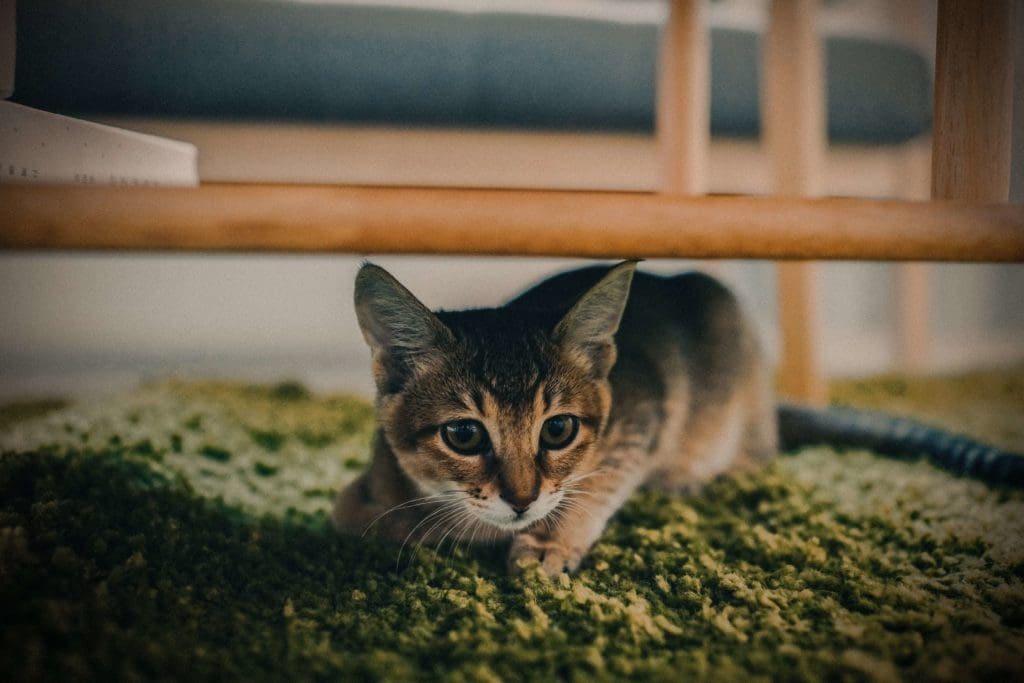It’s easy to forget that our kitties are descended from wild animals. Domestic cats’ earliest ancestor, Felis silvestris lybica prowled the Fertile Crescent, frequently taking to dens to sleep and evade predators. Our modern-day pets may have relatively luxurious lives, but they still retain the instinct to hide.
If your cat is spending a lot of time under the bed, don’t take it personally. Here are some of the most likely reasons your furry friend may be choosing to stay out of sight.
 Your cat may be frightened or nervous.
Your cat may be frightened or nervous.If loud noises or unfamiliar visitors send your cat scurrying into a hiding place, they are probably coping with fear or anxiety. This is especially true for cats who have recently joined the family and are still adjusting to the presence of children or other pets.
Overstimulated cats need time to decompress. While some cats are naturally more anxious than others, fear-based hiding should resolve when they acclimate to their environment or feel the danger has passed.
Similar to some people who are more inclined to be loners, some cats particularly enjoy taking time to themselves. Our kitties’ ancestry motivates them to nap in tucked-away spots, and considering most cats sleep around 15 hours per day, this can mean a lot of time under the bed.
A preference for solitude may be part of your cat’s personality, but offering treats, toys, and affection outside of their favorite hiding spots can encourage them to spend more time in common spaces.

If stowing away is out of character for your cat, hiding may be a sign that your kitty is sick or injured.
Illness and pain trigger your cat’s instinct to find a place to recover that’s out of sight of potential predators. If your typically friendly cat is hiding, look for other signs that they may be unwell, like:
Your cat has a mind and personality of their own, but fortunately, there are ways to help shy kitties become more social.
Punishing your cat for retreating under the bed won’t solve the problem – but it may make it worse. Understand that there are many reasons your kitty may seek solitude, so it’s recommended that you look at the situation from their point of view. Find and address the root cause of hiding behavior, and have empathy for your less-than-social cat.
 Offer alternatives.
Offer alternatives.If your cat is seeking out a cozy, secure spot, offer one that isn’t under the bed. Cats often like to perch and observe from on high, especially when they are seeking respite from kids and other family pets.
Place cat trees and tunnels in common areas of your home to encourage your cat to choose a new favorite place to lounge. Having multiple hiding spots, instead of just one, will encourage your kitty to explore and be comfortable in other areas of the home.
Reward a timid cat’s bravery when they choose to venture out on their own. Positive reinforcement in the form of treats, pets, and playtime can make your kitty more likely to spend time in common areas.
It’s important, however, to let your cat take the lead. Never force them out of their hiding place. Instead, look for ways to help your cat feel safe and secure throughout your home. Further, when they do venture out of their hiding spot, avoid loud noises, strangers, or new scary stimuli if possible during that time.
It’s prudent to make sure that there isn’t an underlying medical reason for your cat’s hiding behavior. Schedule an exam with your veterinarian to determine if your kitty’s shyness is behavioral rather than the result of pain or illness.